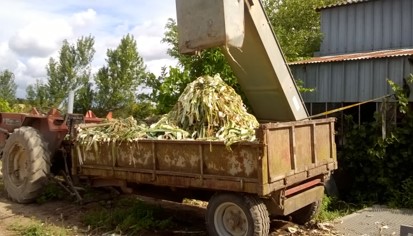New project focuses on ways to use local underutilized waste streams in small-scall biorefineries
Urban, agricultural and industrial activities generate sources of biomass wastes still underexploited. They offer a potential feedstock for biorefinery. Small-scale biorefineries have to answer critical challenges to demonstrate their benefits compared to large scale solutions.

In order to meet the challenge of reaching sustainable development goals, Europe faces the urgent need to avoid both under and nonutilised resources. Still, large amounts of agricultural waste, municipal landscaping, gardening waste and post-consumer wood are buried, dumped or, even burnt. This could be avoided by using such resources in biorefineries and encouraging small-scale flexi-feedstock biorefineries (SFB).
That is the overall aim of a new project FLEXIBI, which is funded within the frame of FACCE SURPLUS.
Under the coordination of INRA, partners from France, Germany, Finland and Belgium-Flanders will develop a flexible and predictable process able to manage variable biomass adapted to local context and feedstocks. Among other things they will implement combined and coordinated modelling and experimental approaches to design a decision support tool devoted to assess the most efficient and sustainable small-scale biorefinery for undervalorised sources of biomass.
Mr. Bernard Cathala from French National Institute for Agronomic Research (INRA) is the leader of the project. He explains:
- The flexi-feed concept refers to the nature of the feedstock or feedstock mixtures from various biomass supply chains. A main driver of the project is to use local and all-year available feedstocks thus limiting transportation and logistics issues.
Support stakeholders in the whole value chain
As small-scale, flexi-feed biorefineries are an emerging activity, there is still limited understanding of the socioeconomic and environmental impacts; this is something the new project will look into.
- Setting up a biorefinery activity in a specific location or region is a complex issue that affects several aspects of the bioeconomy: feedstock availability and products, socio-economic aspects, environmental aspects, technological innovation, Bernard Cathala says.
The FLEXIBI tool will support stakeholders in the whole value chain (waste managers, SFB designers, local authorities) through the implementation of economically viable small-scale solutions.
Other outputs of the project will include new knowledge on the valorization of currently underexploited waste, on the development of high value products and on the management of feedstock mixtures in biorefineries.
To evaluate the relevance of the models and provide demonstration cases to stakeholders, 3 case studies will be conducted in Hamburg, Leuven and Nantes.
- This approach is chosen to consider various conditions within Europe. For each region the feedstock potential and relevant stakeholders will be identified and visualised with maps. A methodology for easy regional data collection and implementation into GIS-based maps will be elaborated to enable the transfer in to other EU locations, Bernard Cathala says.
Several positive environmental values of FLEXIBI outputs can be expected: A direct one will result from the "buffering" function by exploiting wastes that are currently buried - taking into account seasonality and geographic dispersion of biomass sources. The use of biomass at the regional level will also decrease the use of oil based fuel from transportation and logistic.
Besides, FLEXIBI will show a significant positive environmental impact in encouraging the production of fossil-fuel free energy, fertilizers and other components from underutilized biomass.
Further information
The project runs from 2018 to 2021 and partners include: Head of project: INRA (France), University of Hamburg (Germany), Hamburg University of Technology (Germany), Groupe Ecole Supérieure du Bois (France), University of Helsinki (Finland) and University of Leuven (Belgium- Flanders)
Contact
Bernard Cathala
INRA
Tel: 00 33 (0)2 40 67 50 68
Mail: Bernard.Cathala@inra.fr
